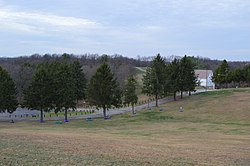Economy is a borough in Beaver County, Pennsylvania, United States. The population was 9,098 at the 2020 census.[3] It is a part of the Pittsburgh metropolitan area.
Economy, Pennsylvania | |
|---|---|
 Fields at Old Economy County Park | |
 Location in Beaver County and the U.S. state of Pennsylvania. | |
| Coordinates: 40°38′18″N 80°11′06″W / 40.63833°N 80.18500°W | |
| Country | United States |
| State | Pennsylvania |
| County | Beaver |
| Settled | 1827 |
| Incorporated | 1957 |
| Government | |
| • Type | Borough Council |
| Area | |
• Total | 17.92 sq mi (46.41 km2) |
| • Land | 17.87 sq mi (46.29 km2) |
| • Water | 0.05 sq mi (0.13 km2) |
| Elevation | 971 ft (296 m) |
| Population | |
• Total | 9,098 |
| • Density | 509.09/sq mi (196.56/km2) |
| Time zone | UTC-5 (Eastern (EST)) |
| • Summer (DST) | UTC-4 (EDT) |
| Zip code | 15005 |
| Area code | 724 |
| FIPS code | 42-22264 |
History
editEconomy Township was established in 1827 and named for Economy, the planned village built by the Harmony Society on the banks of the Ohio River at what is now called Old Economy Village, in the borough of Ambridge. In 1957 residents of Economy Township petitioned for borough status in order to prevent further annexation by surrounding communities. The borough of Economy was established on January 1, 1958.[4]
Geography
editEconomy is located at 40°38′18″N 80°11′6″W / 40.63833°N 80.18500°W (40.638466, −80.184891).[5]
According to the United States Census Bureau, the borough has a total area of 17.8 square miles (46 km2), of which 17.7 square miles (46 km2) is land and 0.1 square miles (0.26 km2) (0.39%) is water.
Surrounding neighborhoods
editEconomy borders seven municipalities, including New Sewickley Township to the north, Harmony Township and Baden to the west, Conway to the northwest, and the Allegheny County neighborhoods of Marshall Township to the east, Franklin Park to the southeast and Bell Acres to the south.
Demographics
edit| Census | Pop. | Note | %± |
|---|---|---|---|
| 1890 | 413 | — | |
| 1960 | 5,925 | — | |
| 1970 | 7,176 | 21.1% | |
| 1980 | 9,538 | 32.9% | |
| 1990 | 9,519 | −0.2% | |
| 2000 | 9,363 | −1.6% | |
| 2010 | 8,970 | −4.2% | |
| 2020 | 9,098 | 1.4% | |
| 2021 (est.) | 9,003 | [3] | −1.0% |
| Sources:[6][7][8][2] | |||
As of the 2000 census,[7] there were 9,363 people, 3,528 households, and 2,854 families residing in the borough. The population density was 529.0 inhabitants per square mile (204.2/km2). There were 3,629 housing units at an average density of 205.0 per square mile (79.2/km2). The racial makeup of the borough was 98.33% White, 0.66% African American, 0.10% Native American, 0.28% Asian, 0.13% from other races, and 0.50% from two or more races. Hispanic or Latino of any race were 0.44% of the population.
There were 3,528 households, out of which 30.8% had children under the age of 18 living with them, 72.1% were married couples living together, 5.9% had a female householder with no husband present, and 19.1% were non-families. 16.7% of all households were made up of individuals, and 8.0% had someone living alone who was 65 years of age or older. The average household size was 2.65 and the average family size was 2.99.
In the borough the population was spread out, with 22.2% under the age of 18, 6.5% from 18 to 24, 28.1% from 25 to 44, 29.6% from 45 to 64, and 13.6% who were 65 years of age or older. The median age was 42 years. For every 100 females there were 99.6 males. For every 100 females age 18 and over, there were 98.0 males.
The median income for a household in the borough was $52,446, and the median income for a family was $60,081. Males had a median income of $41,756 versus $27,121 for females. The per capita income for the borough was $22,453. About 2.0% of families and 2.4% of the population were below the poverty line, including 2.2% of those under age 18 and 5.8% of those age 65 or over.
Education
editChildren in Economy are served by the Ambridge Area School District. The current schools serving Economy are:
- Economy Elementary School – grades K–5
- Ambridge Area Middle School – grades 6–8
- Ambridge Area High School – grades 9–12
See also
editReferences
edit- ^ "ArcGIS REST Services Directory". United States Census Bureau. Retrieved October 12, 2022.
- ^ a b "Census Population API". United States Census Bureau. Retrieved October 12, 2022.
- ^ a b Bureau, US Census. "City and Town Population Totals: 2020-2021". Census.gov. US Census Bureau. Retrieved July 19, 2022.
{{cite web}}:|last1=has generic name (help) - ^ "History of Economy Borough" (PDF). Retrieved September 22, 2023.
- ^ "US Gazetteer files: 2010, 2000, and 1990". United States Census Bureau. February 12, 2011. Retrieved April 23, 2011.
- ^ "Census of Population and Housing". U.S. Census Bureau. Retrieved December 11, 2013.
- ^ a b "U.S. Census website". United States Census Bureau. Retrieved January 31, 2008.
- ^ "Incorporated Places and Minor Civil Divisions Datasets: Subcounty Resident Population Estimates: April 1, 2010 to July 1, 2012". Population Estimates. U.S. Census Bureau. Archived from the original on June 11, 2013. Retrieved December 11, 2013.
Further reading
edit- Kolson Hurley, Amanda (2019). Radical Suburbs: Experimental Living on the Fringes of the American City. Belt Publishing. ISBN 978-1948742368. - case studies of six unusual suburbs